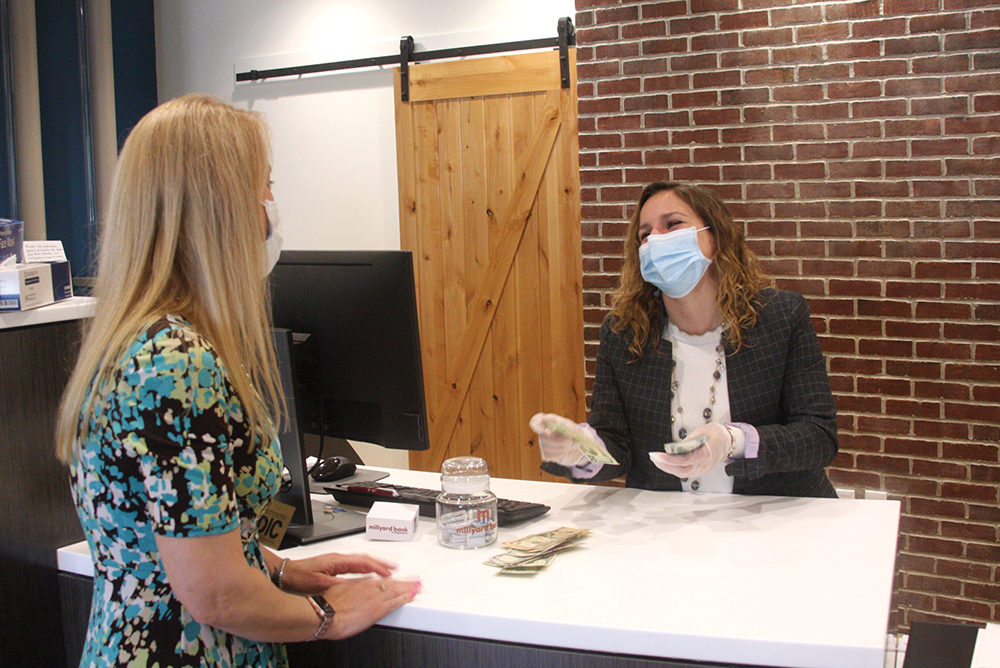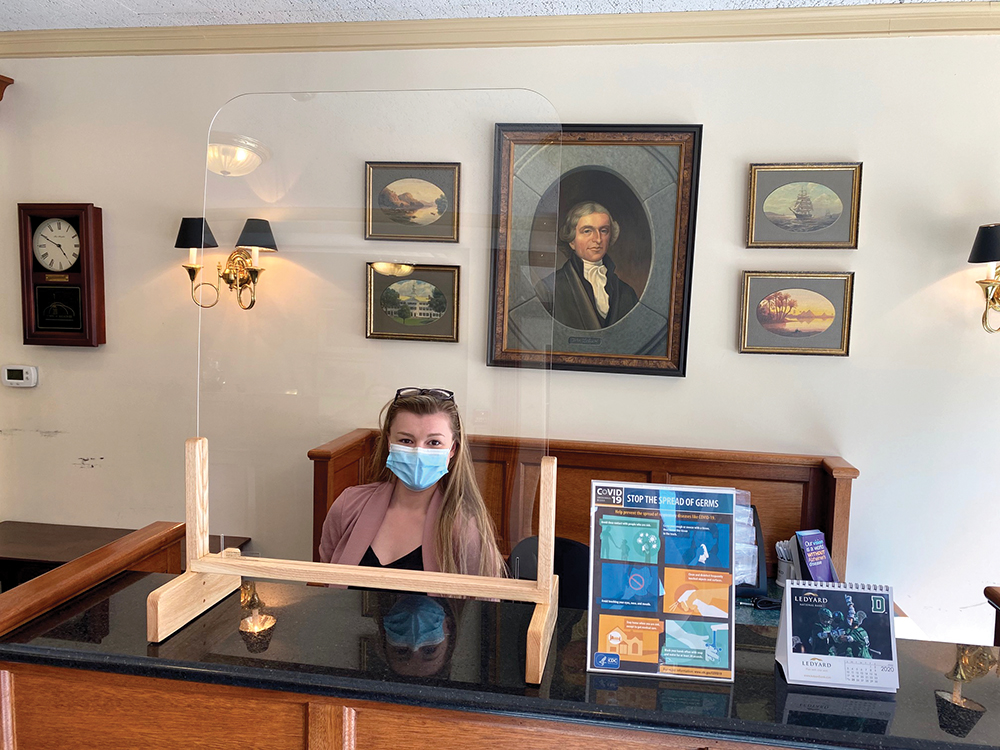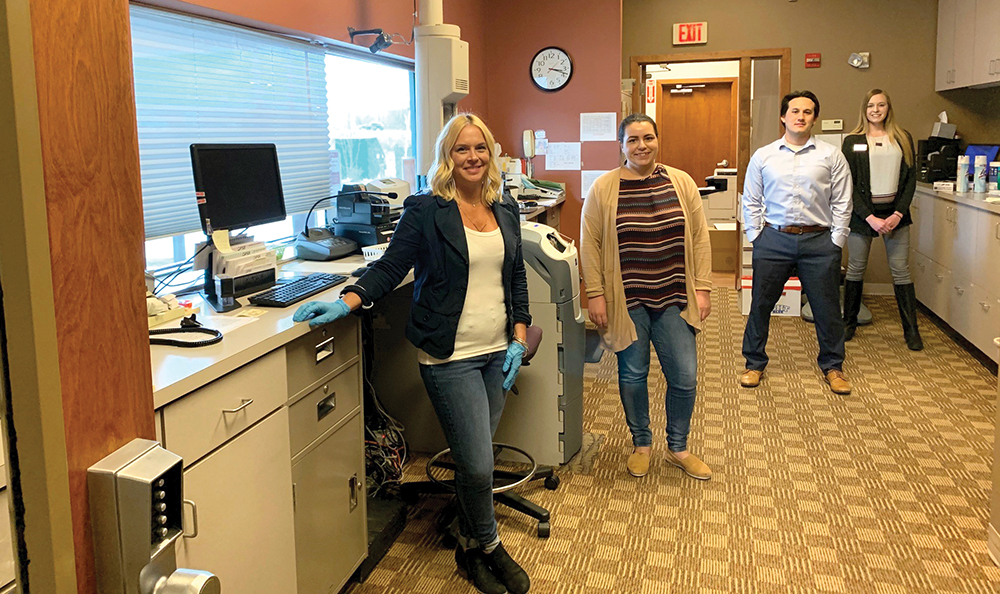
Banking Partner Maggie Scanlon, right, assists Christina Ladue, director of business banking at Millyard Bank. Courtesy photo.
Millyard Bank, which launched last December in Nashua, was getting ready to test its business continuity plan to see if the bank could operate with only three employees, when the first cases of COVID-19 hit NH. The theoretical suddenly became very real.
G. Frank Teas, president of the bank, recalls hearing the news that sports were shutting down for the season and he and his team made the decision to close the bank except for drive-up transactions and appointments. “We went from testing to enacting the plan,” he says.
Similar scenarios played out statewide. A heavily regulated industry, banks must have emergency plans, and as the nation found itself in a pandemic tumult, the banking industry deployed those plans.
While the COVID-19 crisis has brought entire industries to their knees, banking has remained strong, with most banks reporting they have neither furloughed nor laid off employees. In some service areas, business has increased. And, banking has become the definition of an essential service, serving as an economic lifeline for businesses struggling to secure those coveted Paycheck Protection Program (PPP) loans.
Brisk Business
While some companies saw revenue vaporize, financial institutions are busy. In addition to managing PPP loans, low interest rates are spurring a flurry of residential mortgage refinancing, says Nathan Saller, president and CEO of Bellwether Community Credit Union in Manchester. As car purchases decreased, consumer loans fell, but not as much as anticipated, he says.
“People might not be buying as many autos today, but refinancing mortgages is filling some of the volume gaps,” says Joseph Carelli, president of Citizens Bank NH and Vermont. “The banking industry came in with some of the highest capital adequacy ratios and strongest performing loan portfolios since the Great Recession. We came into COVID from an incredible position of strength. … The workload for bankers has picked up exponentially.”
New Hampshire Mutual Bancorp in Concord—the parent company of Meredith Village Savings Bank, Merrimack County Savings Bank, NH Trust and Savings Bank of Walpole—posted a record 250 residential loans totaling $70 million in March and April, says Gregg Tewksbury, president and CEO of NH Mutual Bancorp.
Ledyard National Bank headquartered in Hanover reported a record number of mortgages during the crisis as well as robust activity at its wealth management division, says Kathy Underwood, president and CEO.
While Ledyard is delaying the opening of its new Concord branch from July to September, it will bring that ninth branch online, she says.

Ledyard National Bank installed plexiglass partitions, and employees wear masks to protect themselves and their clients. Courtesy photo.
Primary Bank, which opened a new branch in Derry in early March, actually added two staff members during the crisis and anticipates adding more this year to keep up with demand, says William Stone, president and CEO.
Bangor Savings Bank, which has five branches in NH, will be opening a second Concord branch in November, and is moving forward with plans to open a Manchester branch in early fall, and a second Manchester branch in early 2021. “We have stayed the course. We are pretty energized,” says Kim Pope, senior vice president and director of consumer banking in Portsmouth.
PPP Challenges
As businesses began shutting down and unemployment skyrocketed, the federal government turned to banks and credit unions to get cash quickly into the hands of business owners. As of May 8, 33 of the NH Bankers Association’s 37 member banks reported processing 14,919 PPP loans for NH businesses that totaled more than $1.9 billion and saved 93,959 jobs.
Processing those loans was a massive undertaking, but one that bank presidents say they and their associates were proud to do. “We knew it would be the difference between businesses staying open or closing,” says Dianne Mercier, NH president of People’s United Bank in Manchester.
“We had customers crying they were so grateful,” says Ronald L. Magoon, president and CEO of Franklin Savings Bank.
But PPP loans came with challenges as the program was rolled out before all the guidelines were in place. “We were trying to get our arms around what it meant and educating our customers with the scant information available to us,” Tewksbury says of the early days of the PPP, emphasizing he is not criticizing the SBA. Underwood says new rules came out daily. “We were building the car while driving 100 miles per hour down the road. It was incredibly stressful,” she says.
Saller says financial institutions were learning and gearing up on the fly.
Teas remembers seeing Steven Mnuchin, U.S. secretary of the treasury, on the news announcing with confidence that people could walk into a bank the next day and receive money. “I said, ‘there is no way that can happen’,” he recalls.
Banks were quickly inundated with requests for PPP loans. Carelli says Citizens received 72,000 inquiries over six weeks. “The demand exceeded our expectations,” he says.
Accessing the SBA’s PPP site was unreliable. Some, like Primary Bank, had no problems at all. Others hit roadblocks.
Underwood says where it would usually take staff 10 minutes to process an SBA loan it was taking an hour with PPP loans as they were continually kicked out of the system. “That was incredibly frustrating,” she says.
Franklin Savings Bank found its SBA code in the system had not been activated meaning loan processing was delayed. “It was stressful. We had a number of applications we had started taking and could not enter them. It was a moving target in that the program itself was being built as we were trying to use it,” Magoon says.
Banks quickly funneled resources into processing as many PPP loans as possible before the money ran out, knowing it was first come, first served. And teams worked around the clock.

Franklin Savings Bank staff closing PPP loans at the Tilton office drive-up. Courtesy photo.
The number of PPP loans made in less than a month equates to about two years of NH Mutual Bancorp’s commercial loans, Tewksbury says.
Carelli says Citizens processed the equivalent of 15 years’ worth of SBA loans in under two months. “This is an unprecedented program,” he says.
Much has been made of the concern that only businesses with banking connections could access the funds. New Hampshire Mutual Bancorp focused on existing customers, Tewksbury says, citing limited time and resources. “We supported the customers who supported the banks over the years,” Tewksbury says.
Others, like Primary Bank, processed loans for existing clients and new customers unable to get into the queue at other banks.
As a new bank, Millyard Bank did not have a large client base, allowing it to easily help new PPP applicants, Teas says. “It provided us with the opportunity to be the white knight for some of these folks.”
Saller and Tewksbury say that business owners without a staff accountant or controller found themselves scrambling to gather the necessary information, which delayed their ability to secure loans. “We had to really act as a resource,” Saller says.
As of press time, banks were waiting for additional guidance on loan forgiveness. Underwood says, Ledyard has communicated to borrowers to keep receipts, maintain documentation, and bring employees back.
Kristy Merrill, president of the NH Bankers Association, says the U.S. Treasury did say loans under $2 million would automatically be deemed essential while those over $2 million would need further review. “It’s not the same as forgiveness but the safe harbor statement was welcome,” she says.
Preparing for Defaults
While SBA funds help keep businesses afloat, they’re only a stopgap, says Merrill, adding NH banks are also deferring loan payments and waiving fees for struggling customers.
The economic fallout from COVID-19 has yet to be fully felt. Companies may consider layoffs and furloughs once the bridge financing runs out and some will delay capital improvements. Others, bankers say, will shutter their doors. Saller says when tenants are unable to pay rent, real estate investors must ask for loan deferments.
“Fundamentally there is more risk today than four months ago,” Mercier says. “We account for that risk by building reserves.”
Pope of Bangor Savings Bank says banks are a trailing indicator of the economy. She says the bank is being proactive in engaging its business customers to make plans for either forbearance or additional capital needs as well as to provide guidance.
NH Mutual Bancorp increased its loan loss provision by 300% in Q1. “We are preparing for some significant losses coming out of this,” Tewksbury says, adding he expects greater losses for small businesses than in 2008.
Carelli says banks have many tools to assist clients, noting “Federal regulators have provided us with some leniency around providing support to clients without making the loan a troubled asset. That provides banks with the green light to do more for those clients that need the most.”
Franklin Savings Bank reached out to all of its commercial clients to offer the option to take a 90-day payment deferral and then roll it into the loan, says Magoon. About 30% of those clients accepted the offer, he says. “We did the same offer of 90 days payment deferral on [residential] mortgages,” Magoon says, and the bank waived overdraft fees for 60 days ending May 21.
That is not to say everything is as it was. Mercier says banks will be less interested in past performance. “What happened last year is no longer relevant,” she says. “I need to ask them how they see 2020 moving on from a cash flow perspective and liquidity perspective. What are the risks they are facing and how are they mitigating those risks?”
Underwood says there are many unknowns moving forward, especially what a recession might look like and how long it could last. “We will see traditional commercial loan volume slow down,” she says.
“We’re all very well capitalized and certainly have the strength of our own balance sheet to absorb any losses that are coming” Tewksbury says. “We won’t lose any banks in New Hampshire relative to this.”
Lending Helping Hands and Funds
Banks are doing more than keeping credit flowing and NH banks have given back to their communities during
this pandemic.
In April, Bellwether Community Credit Union donated free take-home dinners to four hospitals for frontline workers. Citizens Bank invested $5 million into a community and small business support program and provided funds to support a microbusiness grant program in NH. Citizens awarded $2 million in grants directly to small businesses throughout the bank’s footprint, Carelli says.
Bank of NH, based in Laconia, donated $10,000 to the NH Food Bank and provided its employees $50 gift cards and encouraged them use them at a local business, says Michael Long, interim president and CEO. It has also sent pizza to local police and fire departments and a hospital to thank frontline responders.
In March, Franklin Savings Bank donated to 21 food pantries. Franklin Savings also purchased gift cards from area restaurants and Magoon says they purchased tax credits from the Community Development Finance Authority to benefit the NH Nonprofit Response Fund.
“This pandemic, this unprecedented event, is a reminder of how important relationships are with community banks,” Magoon says. “When this is over, there will be people who recognize the value of having a community bank in their neighborhood.”
Industry Changes
Stone says while everyone is eager to get back to a “new normal,” everyone is also “trying to understand what that really means.” In May, many bank executives had not yet set a date for fully reopening. “We would like to do it as soon as possible but we want to be smart about it and to not put anyone at any health risk,” Stone says.
Like many banks, Primary Bank is adhering to social distancing guidelines and using directional and distancing markers, installing guards and making masks available. “We monitor our staff now every morning. We have a series of questions we go through with them to make sure they have not come into contact with infected people and are in good health,” Stone says.
Some changes may stick. Virtual meetings may become the norm as employees and customers appreciate the convenience, Mercier says. “We won’t do it 100% of the time but we will do it more often,” she says.
Mercier attributes some of the quick turnaround by banks to advances in technology noting that moving many services online made for a smoother transition. “People who had resisted that technology embraced it,” Mercier says.
Tewksbury says the banking industry’s digital transformation, which began a decade ago, has spiked. The bank is working to allow small businesses to apply for a loan online and have it funded the same day. “That’s the future,” Tewksbury says.

 Current Issue - April 2024
Current Issue - April 2024